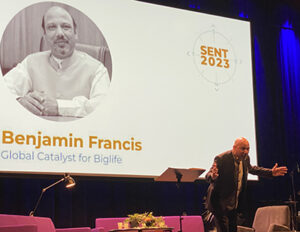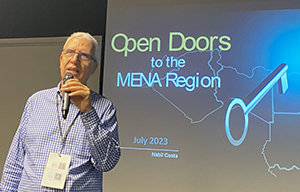God’s people sent to be on mission with God
STAVANGER, Norway—God has given his people a mission to come alongside him to stand against the monstrous forces that oppose “God’s homemaking project,” theologian Miroslav Volf told participants at the Sent 2023 Mission Summit.
From Genesis to Revelation, Scripture reveals God as the homemaker who desires to dwell among his people, said Volf, professor at Yale Divinity School and director of the Yale Center for Faith and Culture.
Volf, author of The Home of God: A Brief Story of Everything, was keynote speaker at the opening session of the mission summit in Stavanger, Norway. The European Baptist Federation sponsored the youth-oriented event in conjunction with the Baptist World Alliance and immediately following the BWA annual meeting.
In the beginning, God enjoyed unhindered fellowship with his human creation until sin entered the world, Volf explained. God entered into covenant with Abraham and gave the law to Moses with the stated desire to “dwell among Israel and be their God,” he noted.
In the New Testament, God the Son entered the world, taking on flesh and dwelling among humanity, he continued. Finally, Revelation speaks of a restored creation and a time when God and humanity will dwell together in the New Jerusalem.
“God created the world to dwell in it,” Volf said. “God the Creator is a homemaker God.”
Monsters disrupt God’s homemaking project
He identified four forces in the world today—which he referred to as metaphorical monsters—that disrupt the home God created and stand in the way of human flourishing.
- Mammon—Love of wealth has created an unjust distribution of resources in which 2.6 billion people are impoverished—“many of whom are either homeless or live under conditions hardly worthy of the name ‘home,’” Volf said.
- Leviathan—Misuse of power reinforces economic injustice and systems in which some are “locked in a gilded prison of luxury and false superiority” while others are “mired in a life of languishing,” he said.
“From the dawn of history until the present day, wealth and power have been thwarting God’s homemaking purpose. More specifically, our inordinate love for wealth and misuse of power have done so,” Volf said.
- Cursus—The constantly escalating pace of living is a modern malady that distorts humanity’s perception of both time and space.
“In short, we are always running behind—always running,” Volf said. “Home needs time, and home needs presence.”
- Medusa—Reification is another modern monster. Like Medusa, who turned living things into stone, it turns people created in God’s image into “cold, lifeless things” that can be manipulated and used.
Christians find their calling in the midst of this conflict between God the homemaker and the monsters that are unleashed within the home, Volf asserted.
“Jesus was God in the world on the mission of planetary homemaking. He gave the disciples his Spirit so that they would continue his mission and do their part in helping make the world into God’s home and ours,” Volf said.
“We can open ourselves to God’s transformative presence. We ourselves can be homes of God and homemakers with God while we await the coming home of God.”
‘Take action to fulfill the vision’
Benjamin Francis of West Bengal, India, global catalyst for the Biglife discipleship movement, challenged young adults to allow God to give them a vision of the world as he sees it and give them a burden for the spiritually lost.

“We are in the business of plundering hell to populate heaven,” he said.
The harvest is plentiful, but God’s people need to respond to God’s call to share the gospel and make disciples, he said.
“Take action to fulfill the vision,” Francis said. “If you want to see what you have never seen, you’ve got to do what you have never done.”
Up to 2.1 million refugees from Syria entered Lebanon after the civil war began in their homeland in March 2011. They carried few material possessions but carried “the burden of memories of loss,” said Naji Daoud, project consultant of True Vine Church in Zahlé, Lebanon.
“They were helpless and hopeless, with no idea how they could improve their situation,” Daoud said.
True Vine Church offered hospitality to the newcomers, providing food, shelter, clothing, mattresses and health care, along with educational opportunities for more than 600 Syrian children.
As members of True Vine Church developed relationships with their new neighbors, they recognized the refugees had a need that affected both their physical well-being and their sense of dignity and worth. They had no way to clean their clothes.
So, the church built a laundry facility to serve the refugee community, complete with four washing machines and four dryers.
While the Syrian women waited for their laundry to wash and dry, and while their children played in a safe area nearby, women from True Vine Church got acquainted with them. Together, they watched the “Jesus” film in Arabic.
“Many gave their lives and hearts to Jesus Christ, and Bible studies emerged,” Daoud said.
God opened doors to Christian witness as members of True Vine Church took on the role of servants, seeking to meet the needs of their refugee neighbors.
“We’re not just washing their clothes. We’re washing their feet,” he said.
‘The challenge is us’
Nabil Costa, executive director of the Lebanese Society for Educational and Social Development, said God’s people must walk through the doors God has opened to present the gospel to the Middle East and North Africa.

“We’ve always been praying for God to change the hearts of Muslims. God answered the prayer,” Costa said. “Now the challenge is us—not them.”
Arab Baptist Theological Seminary graduates serve in 16 countries, and 40 percent of the current 250-member student body come from non-Christian backgrounds, he reported.
Beirut Baptist School has about 1,500 students enrolled, and 92 percent of the student body is Muslim. Parents choose to send their children to a Baptist school in spite of its Baptist Christian identity, because they want their children to have an excellent education, he said.
The “job description” for Christians working in a predominantly Muslim part of the world characterized by unrest and division is straightforward—“hope distribution,” he said.
“Our Lord is the Lord of miracles,” Costa said. “There are many open doors. God always has open doors. The challenge is us.”